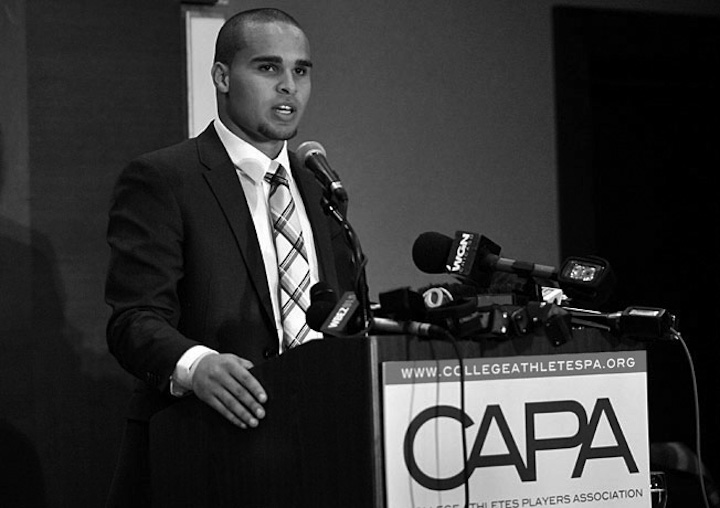Student athlete unionization costly, detrimental
Northwestern athlete Cain Kolter speaks on unionization. Photo courtesy of David Banks/Getty Images.
While I enjoy a rousing game of softball, I’m certainly not an athlete. I’m concerned about the current debate regarding the unionization of student athletes, though.
Generally speaking, a union is defined as an organized association of workers formed to protect their rights and interests.
If allowed, student athletes could now form unions to unite together so they could conceivably present a demanding presence within their respective schools. This will ensure athletes’ rights and health are protected, they are satisfied with their university experiences and, most concerning, that any economic benefits to the schools are fairly shared.
Now that student unionization ground has been achieved by the football team of Northwestern University in Chicago, the idea of unions has become an alluring concept, especially with the promise of income and bargaining power.
There are some positive benefits student athletes would gain from unions. For example, college sport injuries are common. Union bargaining power could potentially ensure members’ health and safety concerns are addressed, monitored and closely tended to.
While the majority of student athletes don’t sustain serious injuries, some do incur career-ending injuries, which affect their plans of supporting themselves in the future on their athletic talent, or worse, affect their employability for the rest of their lives.
Union membership could ensure proper health coverage and treatment and possibly provide long-term compensation for catastrophic injuries. When a member has a grievance with the university, their union leaders work with the university to resolve the issue.
Positive arguments aside, most of the discrepancies are about money.
Many student athletes, especially those in the larger men’s sports, feel entitled to compensation because of revenue they bring to their universities. However, Title IX requires if one student athlete is paid, every student athlete at the university must be paid. Most student sport programs are not self-sustaining — the income from some supports the others.
Since many student sports programs are not self-sustaining, where would all this wage money come from?
The most likely funds to pay athletes’ wages would be the athletic scholarship program and from savings achieved by dissolving the various non-self-supporting sports programs and related student organizations.
If this occurred, the entire student body would be affected negatively. Fewer students would receive scholarships because scholarship dollars would be converted to athlete wages. Fewer students would participate in fewer sports.
Further, if the student athlete unions’ strength grew and their requests become more demanding, additional funds could stream to the athletic department, diminishing the possibility for growth and improvements to other parts of UND’s academic and research oriented programs. Student fees and tuition rates would have to rise to make up for the shortfall, discouraging the addition of new students.
If a significant dispute developed between the university and the student athletes, a real possibility for a strike would exist.
I don’t feel my academic oriented college experience would be enhanced by empty stadiums and disgruntled student athletes in picket lines.
The NCAA sums up the topic well when it argues, “This union-backed attempt to turn student athletes into employees undermines the purpose of college: education. Student athletes are not employees, and their participation in college sports is voluntary.”
I am against the unionization of student athletes. I would prefer not to attend a college where I would be required to pay heightened tuition and fees to support wage-based athletic programs.
I’m not in college to support the university’s athletics; I’m in college to focus on academics to better my education. If the student athletes of UND attempt to unionize, it would negatively impact their college experience, the student body and the university.
What ever happened to the thrill of competition just for the love of the game? Student athletes should consider this and remember the real reasons they play.
Margaret Upton is a columnist for The Dakota Student. She can be reached at [email protected].










